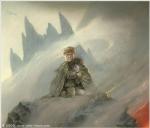Quote
Overall, The Winds of Khalakovo is quite successful – the characters are well-rounded and interesting, the Imperial Russian-inspired culture feels fresh (even though non-western settings has become quite popular in the past year or two), the gypsy-like culture of the indigenous Aramahn is well-done, and the action is as much political as physical.
And it's the politics that I've kept coming back to in my almost 2-months of thinking on this. The politics of The Winds of Khalakovo are widely praised as the biggest strength of this book. However, the reaction that I can't help but come to is this: if the politics in this book are praised as a complex addition to the fantasy genre, what does it say about the genre as a whole? Or to put it another way, if these are good politics, then fantasy must be full of really badly (or perhaps, simply) presented politics. And in my opinion, that is a very sad fact.
When I use the term politics, I'm not really speaking of the politics we are bombarded with by media in our society today (particularly during an election year here in the US). What I am speaking of are the complex relations of people in power, who want to be in power, who were once in power - from the top of society all the way down to the interactions among the least of a society. The shifting alliances, the lies, the truths, betrayal, idealism, heroism, morality, religion, sex, best intentions, selfishness, and flat-out evil, inhumane actions. It's the politics of people and their interactions. It’s what drives our world and it's what all too many fantasy novels completely lack. It's what turns a good story into a compelling novel.
In my opinion, the politics of The Winds of Khalakovo are not complex or particularly deep - I found them rather linear and predictable. But, they do play a central role in the book, much more so than in many other books which tend to focus much more heavily on individual goals and motivations (there's plenty of that here as well) rather than the complex interactions of many individuals, government, societies, etc. This has only made me realize more and more why those that are praised at the top of genre belong there - they do the politics well. George RR Martin and K.J.Parker immediately leap to the top in this respect. Other authors I love at least have their moments - David Anthony Durham, S.L. Farrell, and Robert Jordan (for all his faults it's the politics of that series that I enjoy the most).
Full Review
And it's the politics that I've kept coming back to in my almost 2-months of thinking on this. The politics of The Winds of Khalakovo are widely praised as the biggest strength of this book. However, the reaction that I can't help but come to is this: if the politics in this book are praised as a complex addition to the fantasy genre, what does it say about the genre as a whole? Or to put it another way, if these are good politics, then fantasy must be full of really badly (or perhaps, simply) presented politics. And in my opinion, that is a very sad fact.
When I use the term politics, I'm not really speaking of the politics we are bombarded with by media in our society today (particularly during an election year here in the US). What I am speaking of are the complex relations of people in power, who want to be in power, who were once in power - from the top of society all the way down to the interactions among the least of a society. The shifting alliances, the lies, the truths, betrayal, idealism, heroism, morality, religion, sex, best intentions, selfishness, and flat-out evil, inhumane actions. It's the politics of people and their interactions. It’s what drives our world and it's what all too many fantasy novels completely lack. It's what turns a good story into a compelling novel.
In my opinion, the politics of The Winds of Khalakovo are not complex or particularly deep - I found them rather linear and predictable. But, they do play a central role in the book, much more so than in many other books which tend to focus much more heavily on individual goals and motivations (there's plenty of that here as well) rather than the complex interactions of many individuals, government, societies, etc. This has only made me realize more and more why those that are praised at the top of genre belong there - they do the politics well. George RR Martin and K.J.Parker immediately leap to the top in this respect. Other authors I love at least have their moments - David Anthony Durham, S.L. Farrell, and Robert Jordan (for all his faults it's the politics of that series that I enjoy the most).
Full Review
This post has been edited by kcf: 27 July 2012 - 08:51 PM

 Help
Help













